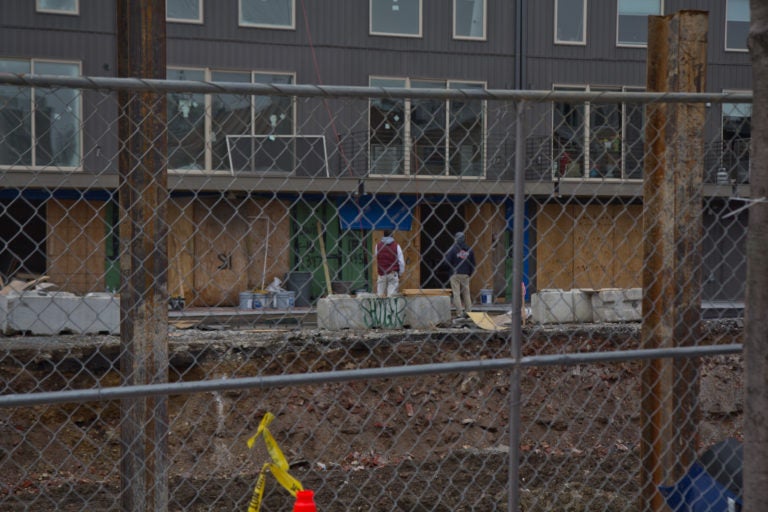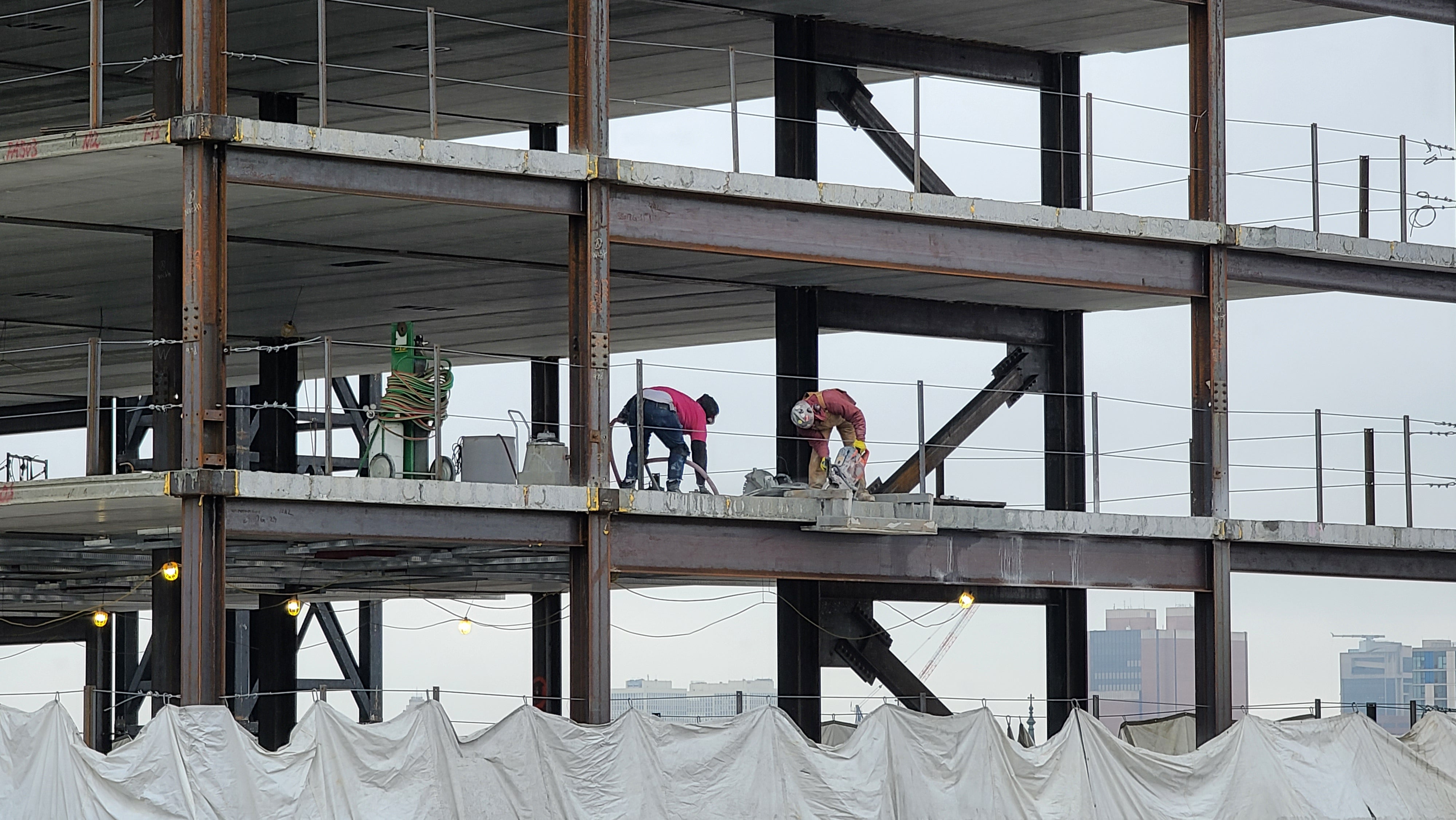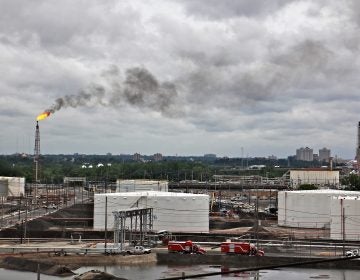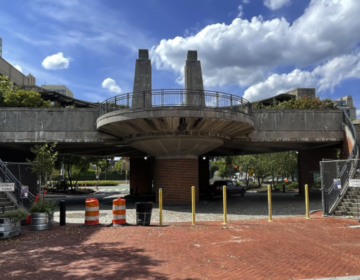Philly pushes for time to close construction sites as workers face uncertainty
The coronavirus has caught up to Philadelphia’s construction and development industry, dealing a blow to a boom that created tens of thousands of jobs.

Construction workers on the job at 19th and Reed streets in South Philadelphia in March 2020. (Kimberly Paynter/WHYY)
On Thursday afternoon, large swaths of Philadelphia were unnaturally quiet. South Street was shuttered, and Center City eerily empty.
But in the neighborhoods, and at large development sites around the city, the sounds of building continued. Earlier in the week, the City of Philadelphia included construction among the “essential businesses” that did not have to close in the face of the coronavirus pandemic.
“Everyone’s down but us, dude,” said Billy Buckman, a carpenter working on Haffey Properties’ Wharton Court development at 20th and Wharton in South Philadelphia “We’re still plugging away. But none of us are shaking hands and no one really interacts with each other as much, especially inside the houses.”
The coronavirus has finally caught up to Philadelphia’s construction and development industry, one of the primary beneficiaries of an economic boom that is now officially over.
A few hours later, Pennsylvania Governor Tom Wolf ordered all “non-life-sustaining” businesses to close for an indefinite period, beginning Friday at the close of business. The shutdown deals a blow to an until-now thriving industry that employed tens of thousands across the region.
Mayor Jim Kenney’s administration is trying to win the industry a little extra time to close down their work sites.
“The governor has said construction needs to shut down by tonight,” said Brian Abernathy, Philadelphia’s Managing Director, at a press conference on Friday afternoon. “We think that’s incredibly difficult for a number of operators. They need time to button up their sites.”
The construction industry and the building trades unions began issuing warnings about the coronavirus a few weeks ago, encouraging contractors to institute more stringent hygiene standards on work sites.
The General Building Contractors Association recommended making hand sanitizer and soap widely available to work crews and discouraged sharing equipment or crowding any area of a worksite.
“We’re washing our hands a lot more, probably more than any contractors ever washed his hands in his life,” said Rob Vanderslice, superintendent of OCF Realty’s project at the former Walter Smith School, on Thursday afternoon. “The big thing with construction sites is keeping guys clean. We put hand-washing stations throughout the building and stuff like that. I got guys cleaning non-stop right now.”
Inside OCF Realty’s Walter Smith School rehabilitation, hand sanitizer dispensers were installed at many of the doors. Vanderslice instituted a rule this week to keep workers from throwing their water bottles and food packaging on the ground.
Vanderslice said that, as of Thursday, he hadn’t had anyone call out sick or refuse to come in. But the mood was definitely pensive, even before word came down of Governor Wolf’s order. The coronavirus is all anyone is talking about.
“Everybody’s worried, we’d be crazy not to be,” said Vanderslice, as the construction equipment echoed over the job site and workers in hard hats scurried in and out of the hulking school building.
“Everybody’s worried about their job more than anything else,” Vanderslice. “But you’re here first thing in the morning and here till the end of the day. I mean, you can see the trucks. We got drywall being delivered. Guys are installing and all the supply houses are open. If that keeps going, we could be okay.”
A mere four hours later, residential construction was declared a non-life-sustaining business in Pennsylvania.
Earlier in the week, Leo Addimando of Alterra Property group said although the pandemic and its fallout hadn’t yet caught up to the construction industry, it was only a matter of time.
“We’re already in a recession, the data just hasn’t caught up yet,” said Addimando, who is also vice president of the Building Industry Association. “A lot of folks have been asking for years how this economic cycle will come to an end. The answer is the coronavirus.”

For many of those employed by the industry, the uncertainty that already grips huge swaths of the service sector economy will now be their new reality.
“Unfortunately, we’re not a remote work environment, so the only way that the buildings are gonna get built is if people are on-site doing it,” said Benjamin Connors, president of the General Building Contractors Association, in an interview earlier this week. “People do have to work in concert with one another, and there’s no getting around that.”
U.S. Bureau of Labor Statistics shows around 12,000 people employed in the construction industry in Philadelphia proper. When the lens zooms out to include the entire Philadelphia metropolitan area, it shows 120,000 people employed in construction, including workers in parts of New Jersey, Delaware, and Maryland.
Neither Buckman nor Vanderslice live in Philadelphia or even Pennsylvania. Pausing the state’s development industry will have major economic ripple effects outside its borders.
The impact of Friday’s shutdown orders extends beyond those employed by the construction and real estate industries. The pause will bring change for those living in neighborhoods where construction and its attendant noise have become a daily part of their community, if not always welcomed.
Vanderslice said he heard as much from a friend at OCF Realty, one of the office workers who had begun working from home already.
“His wife said it kind of makes them feel good to hear the equipment going, it adds a little normalcy,” said Vanderslice.
He paused and sighed.
“I went through the ’08 recession, I went through the recession in the 1980s,” said Vanderslice. “We all came out the other end. But I think we’re going to take a pretty bad economic hit.”
WHYY is your source for fact-based, in-depth journalism and information. As a nonprofit organization, we rely on financial support from readers like you. Please give today.






![CoronavirusPandemic_1024x512[1]](https://whyy.org/wp-content/uploads/2020/03/CoronavirusPandemic_1024x5121-300x150.jpg)



